Ethical Management: Cultural Values, CSR, and Organizational Ethics
VerifiedAdded on 2023/06/10
|9
|941
|68
Report
AI Summary
This report explores how organizations can adopt ethical codes within different cultural value systems, recognizing the needs of diverse cultures and societies. It discusses factors affecting organizational ethics, including legal requirements, stakeholder needs, personal codes, company policies, and the ethical climate. The report also examines the impact of business ethics on corporate social responsibility and organizational accountability, emphasizing the importance of ethical standards in decision-making and corporate culture. By analyzing the interplay between ethics, values, and cultural differences, the report concludes that ethical management involves creating an environment where employees can make appropriate decisions in ethical situations, contributing to a sustainable and responsible organizational future. The document is available on Desklib, a platform offering study tools and solved assignments for students.
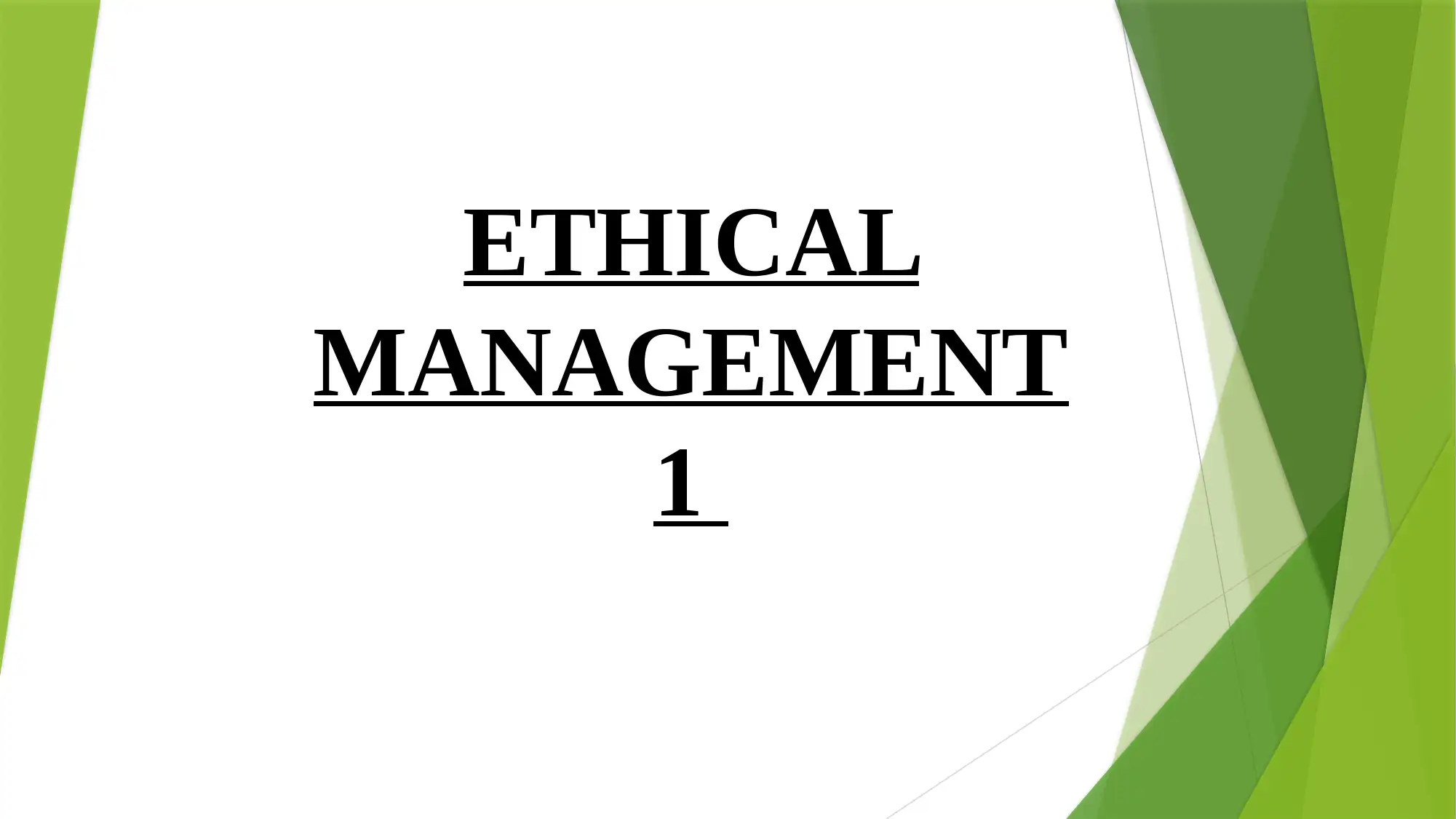
ETHICAL
MANAGEMENT
1
MANAGEMENT
1
Paraphrase This Document
Need a fresh take? Get an instant paraphrase of this document with our AI Paraphraser
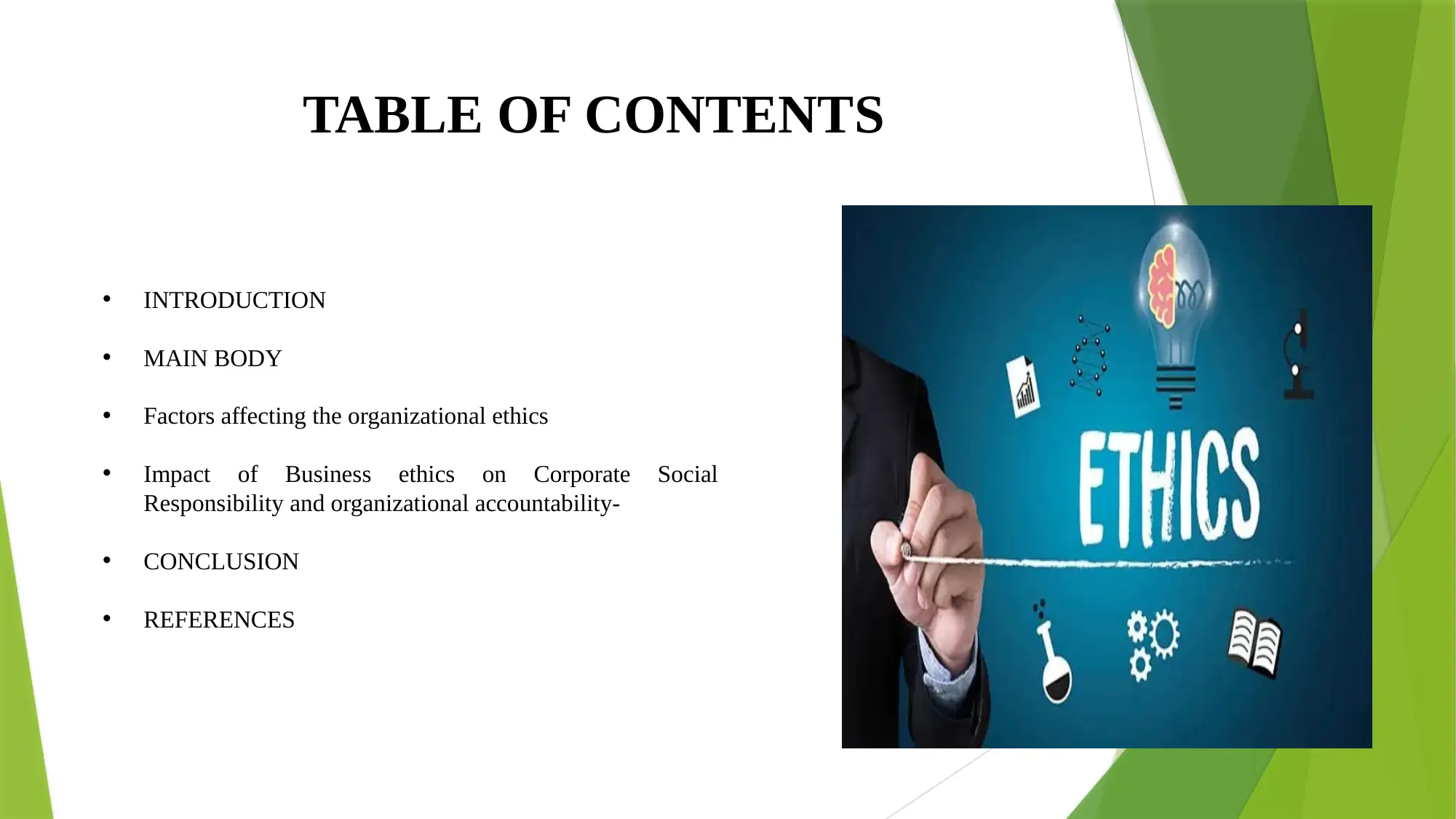
TABLE OF CONTENTS
• INTRODUCTION
• MAIN BODY
• Factors affecting the organizational ethics
• Impact of Business ethics on Corporate Social
Responsibility and organizational accountability-
• CONCLUSION
• REFERENCES
• INTRODUCTION
• MAIN BODY
• Factors affecting the organizational ethics
• Impact of Business ethics on Corporate Social
Responsibility and organizational accountability-
• CONCLUSION
• REFERENCES
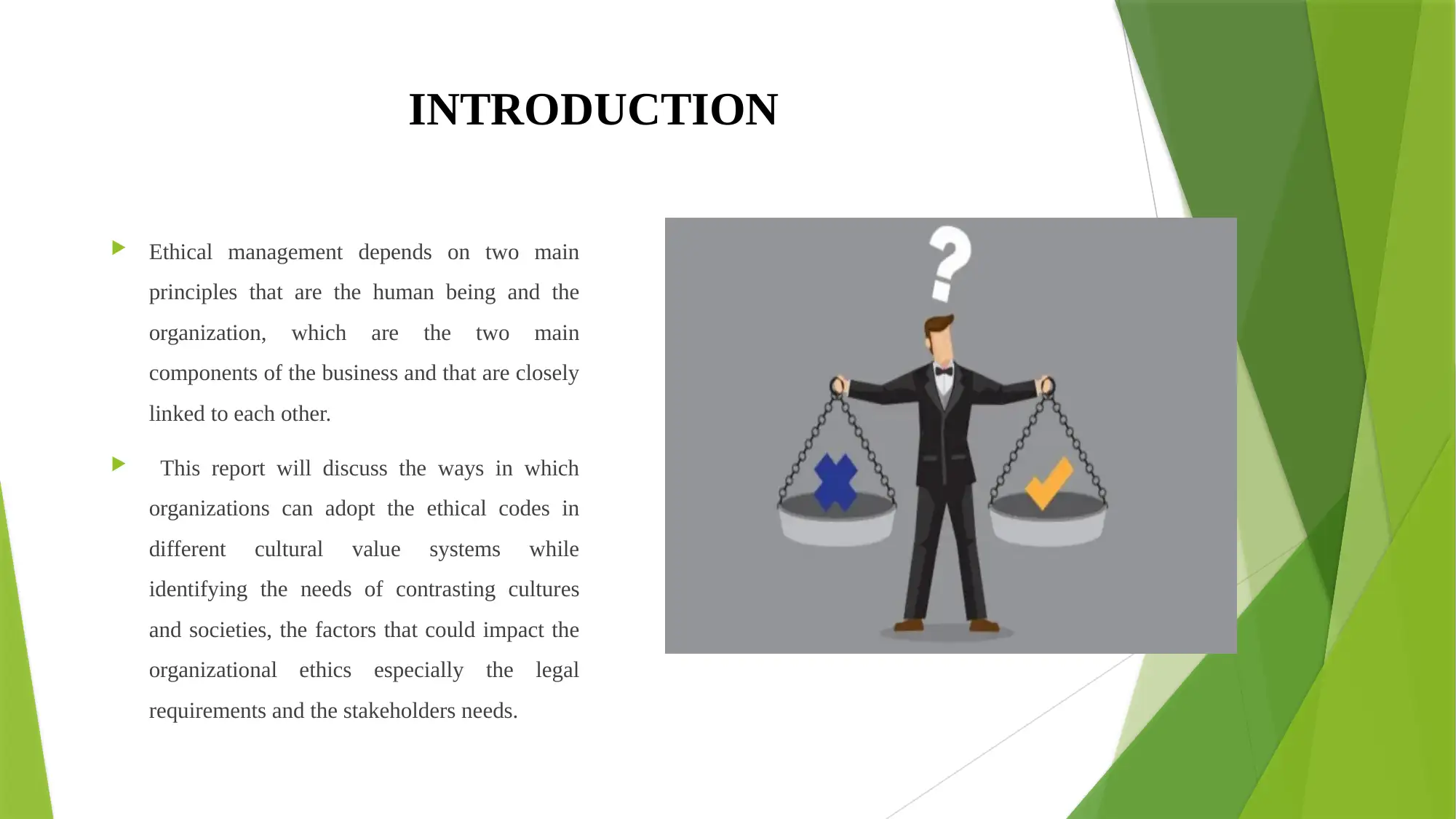
INTRODUCTION
Ethical management depends on two main
principles that are the human being and the
organization, which are the two main
components of the business and that are closely
linked to each other.
This report will discuss the ways in which
organizations can adopt the ethical codes in
different cultural value systems while
identifying the needs of contrasting cultures
and societies, the factors that could impact the
organizational ethics especially the legal
requirements and the stakeholders needs.
Ethical management depends on two main
principles that are the human being and the
organization, which are the two main
components of the business and that are closely
linked to each other.
This report will discuss the ways in which
organizations can adopt the ethical codes in
different cultural value systems while
identifying the needs of contrasting cultures
and societies, the factors that could impact the
organizational ethics especially the legal
requirements and the stakeholders needs.
⊘ This is a preview!⊘
Do you want full access?
Subscribe today to unlock all pages.

Trusted by 1+ million students worldwide
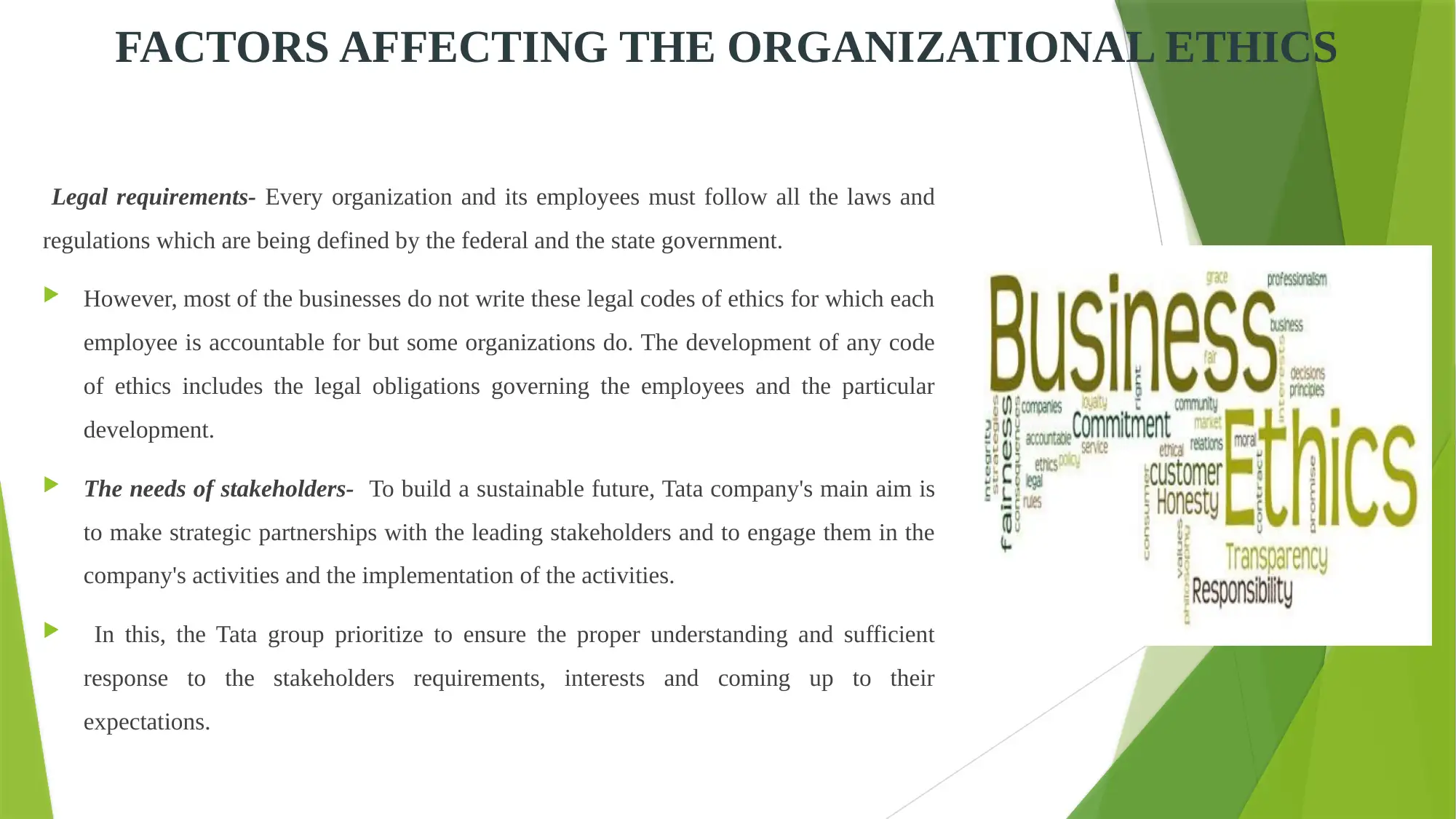
FACTORS AFFECTING THE ORGANIZATIONAL ETHICS
Legal requirements- Every organization and its employees must follow all the laws and
regulations which are being defined by the federal and the state government.
However, most of the businesses do not write these legal codes of ethics for which each
employee is accountable for but some organizations do. The development of any code
of ethics includes the legal obligations governing the employees and the particular
development.
The needs of stakeholders- To build a sustainable future, Tata company's main aim is
to make strategic partnerships with the leading stakeholders and to engage them in the
company's activities and the implementation of the activities.
In this, the Tata group prioritize to ensure the proper understanding and sufficient
response to the stakeholders requirements, interests and coming up to their
expectations.
Legal requirements- Every organization and its employees must follow all the laws and
regulations which are being defined by the federal and the state government.
However, most of the businesses do not write these legal codes of ethics for which each
employee is accountable for but some organizations do. The development of any code
of ethics includes the legal obligations governing the employees and the particular
development.
The needs of stakeholders- To build a sustainable future, Tata company's main aim is
to make strategic partnerships with the leading stakeholders and to engage them in the
company's activities and the implementation of the activities.
In this, the Tata group prioritize to ensure the proper understanding and sufficient
response to the stakeholders requirements, interests and coming up to their
expectations.
Paraphrase This Document
Need a fresh take? Get an instant paraphrase of this document with our AI Paraphraser
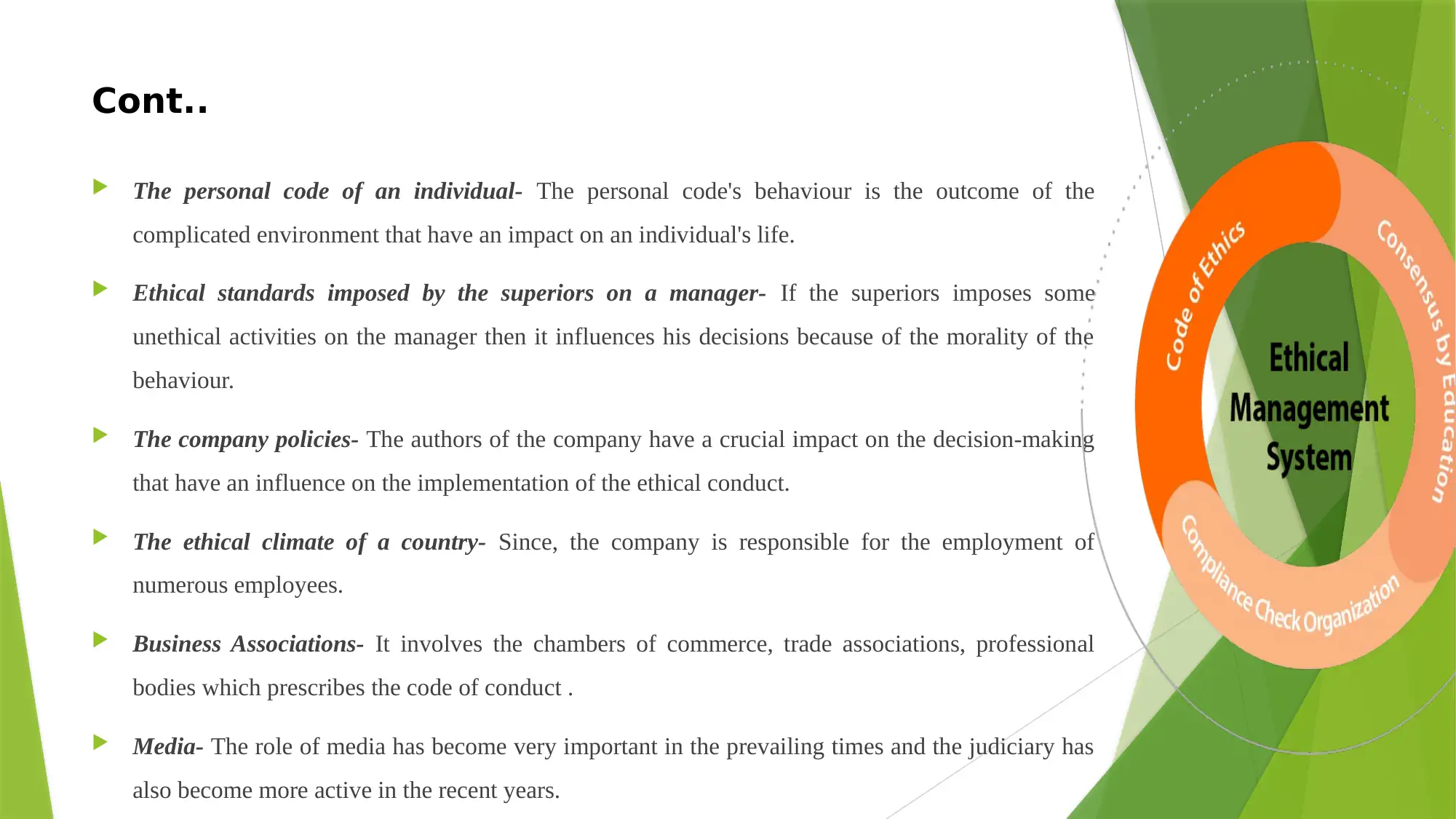
Cont..
The personal code of an individual- The personal code's behaviour is the outcome of the
complicated environment that have an impact on an individual's life.
Ethical standards imposed by the superiors on a manager- If the superiors imposes some
unethical activities on the manager then it influences his decisions because of the morality of the
behaviour.
The company policies- The authors of the company have a crucial impact on the decision-making
that have an influence on the implementation of the ethical conduct.
The ethical climate of a country- Since, the company is responsible for the employment of
numerous employees.
Business Associations- It involves the chambers of commerce, trade associations, professional
bodies which prescribes the code of conduct .
Media- The role of media has become very important in the prevailing times and the judiciary has
also become more active in the recent years.
The personal code of an individual- The personal code's behaviour is the outcome of the
complicated environment that have an impact on an individual's life.
Ethical standards imposed by the superiors on a manager- If the superiors imposes some
unethical activities on the manager then it influences his decisions because of the morality of the
behaviour.
The company policies- The authors of the company have a crucial impact on the decision-making
that have an influence on the implementation of the ethical conduct.
The ethical climate of a country- Since, the company is responsible for the employment of
numerous employees.
Business Associations- It involves the chambers of commerce, trade associations, professional
bodies which prescribes the code of conduct .
Media- The role of media has become very important in the prevailing times and the judiciary has
also become more active in the recent years.
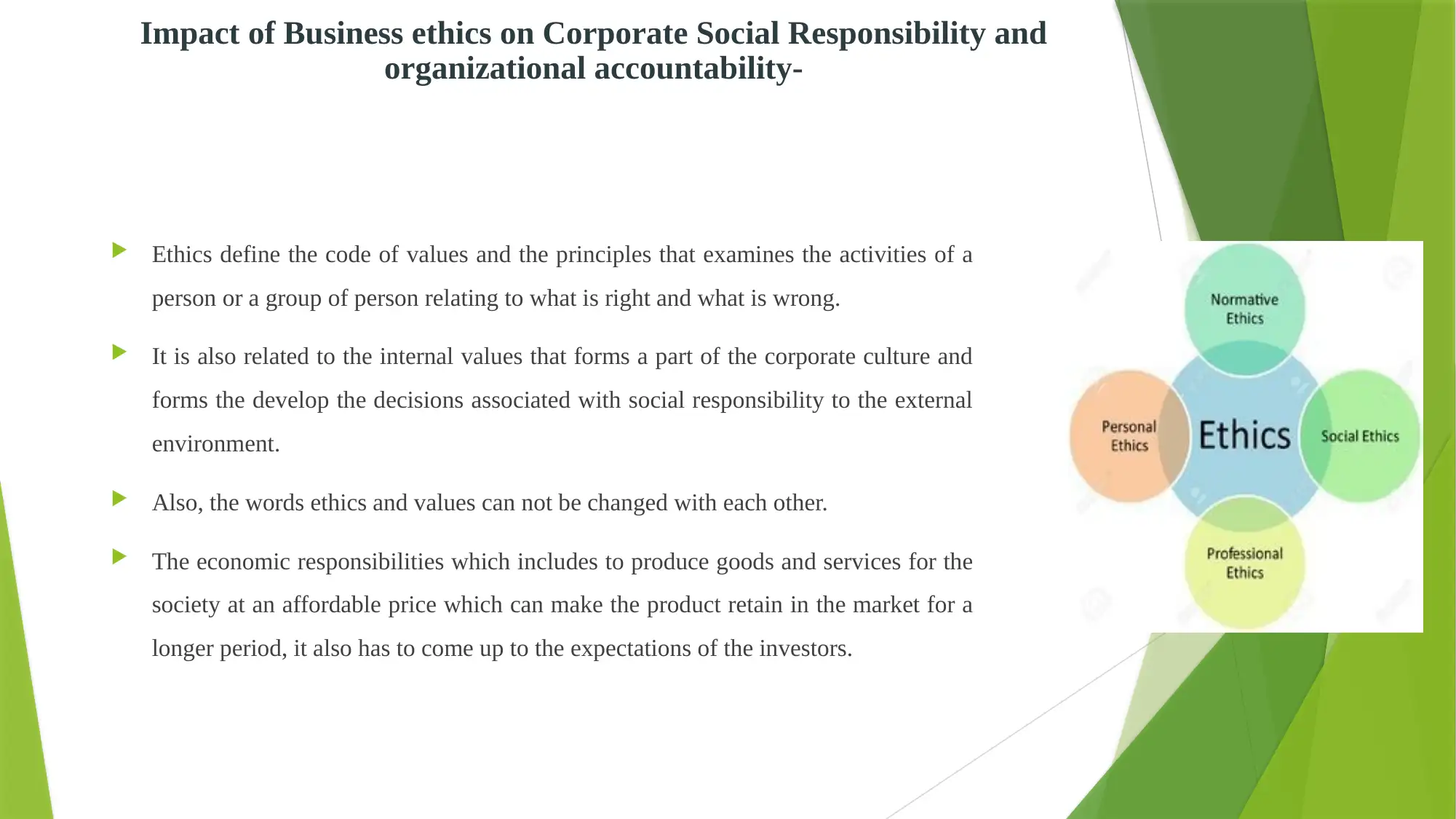
Impact of Business ethics on Corporate Social Responsibility and
organizational accountability-
Ethics define the code of values and the principles that examines the activities of a
person or a group of person relating to what is right and what is wrong.
It is also related to the internal values that forms a part of the corporate culture and
forms the develop the decisions associated with social responsibility to the external
environment.
Also, the words ethics and values can not be changed with each other.
The economic responsibilities which includes to produce goods and services for the
society at an affordable price which can make the product retain in the market for a
longer period, it also has to come up to the expectations of the investors.
organizational accountability-
Ethics define the code of values and the principles that examines the activities of a
person or a group of person relating to what is right and what is wrong.
It is also related to the internal values that forms a part of the corporate culture and
forms the develop the decisions associated with social responsibility to the external
environment.
Also, the words ethics and values can not be changed with each other.
The economic responsibilities which includes to produce goods and services for the
society at an affordable price which can make the product retain in the market for a
longer period, it also has to come up to the expectations of the investors.
⊘ This is a preview!⊘
Do you want full access?
Subscribe today to unlock all pages.

Trusted by 1+ million students worldwide
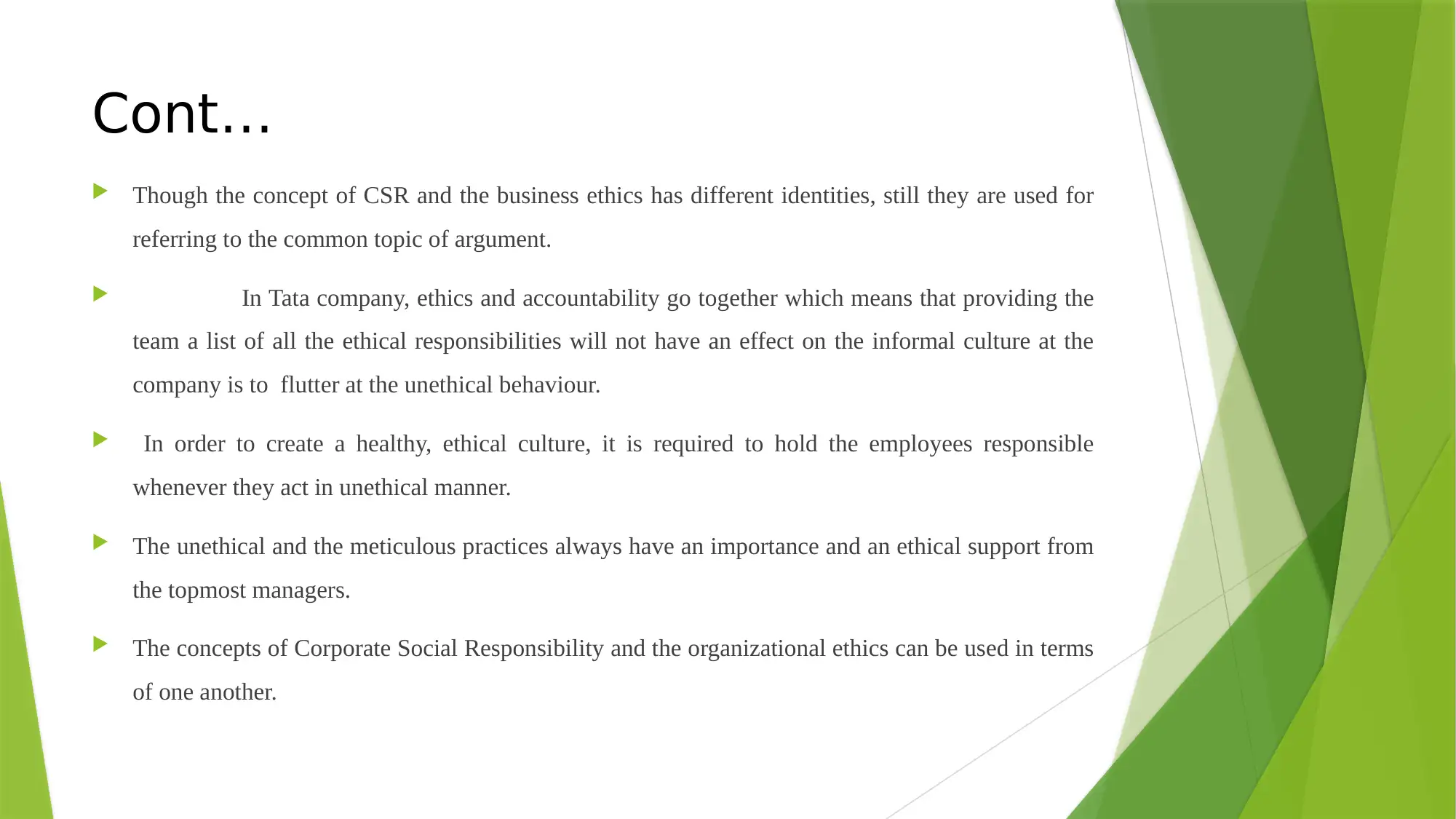
Cont…
Though the concept of CSR and the business ethics has different identities, still they are used for
referring to the common topic of argument.
In Tata company, ethics and accountability go together which means that providing the
team a list of all the ethical responsibilities will not have an effect on the informal culture at the
company is to flutter at the unethical behaviour.
In order to create a healthy, ethical culture, it is required to hold the employees responsible
whenever they act in unethical manner.
The unethical and the meticulous practices always have an importance and an ethical support from
the topmost managers.
The concepts of Corporate Social Responsibility and the organizational ethics can be used in terms
of one another.
Though the concept of CSR and the business ethics has different identities, still they are used for
referring to the common topic of argument.
In Tata company, ethics and accountability go together which means that providing the
team a list of all the ethical responsibilities will not have an effect on the informal culture at the
company is to flutter at the unethical behaviour.
In order to create a healthy, ethical culture, it is required to hold the employees responsible
whenever they act in unethical manner.
The unethical and the meticulous practices always have an importance and an ethical support from
the topmost managers.
The concepts of Corporate Social Responsibility and the organizational ethics can be used in terms
of one another.
Paraphrase This Document
Need a fresh take? Get an instant paraphrase of this document with our AI Paraphraser
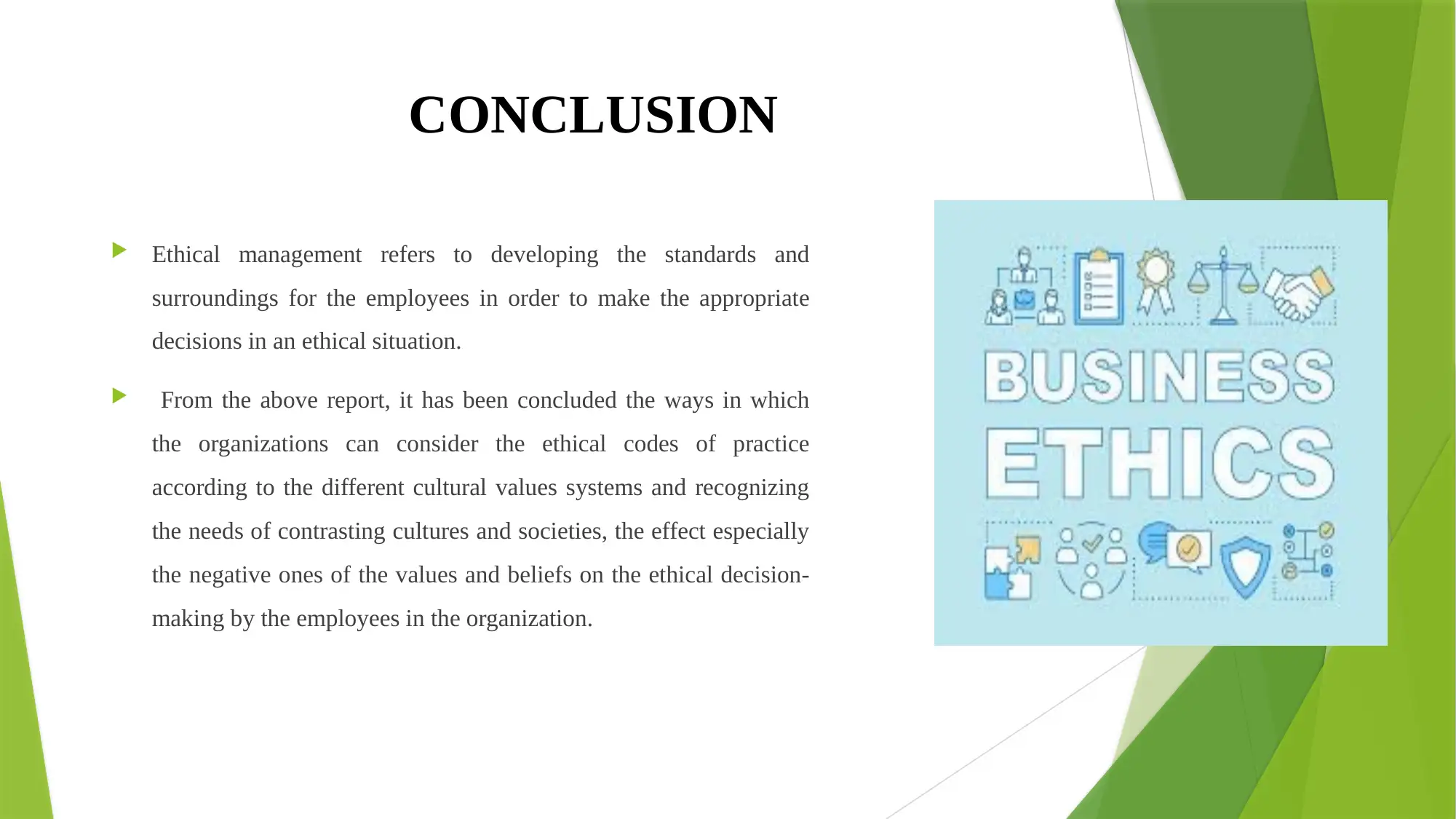
CONCLUSION
Ethical management refers to developing the standards and
surroundings for the employees in order to make the appropriate
decisions in an ethical situation.
From the above report, it has been concluded the ways in which
the organizations can consider the ethical codes of practice
according to the different cultural values systems and recognizing
the needs of contrasting cultures and societies, the effect especially
the negative ones of the values and beliefs on the ethical decision-
making by the employees in the organization.
Ethical management refers to developing the standards and
surroundings for the employees in order to make the appropriate
decisions in an ethical situation.
From the above report, it has been concluded the ways in which
the organizations can consider the ethical codes of practice
according to the different cultural values systems and recognizing
the needs of contrasting cultures and societies, the effect especially
the negative ones of the values and beliefs on the ethical decision-
making by the employees in the organization.
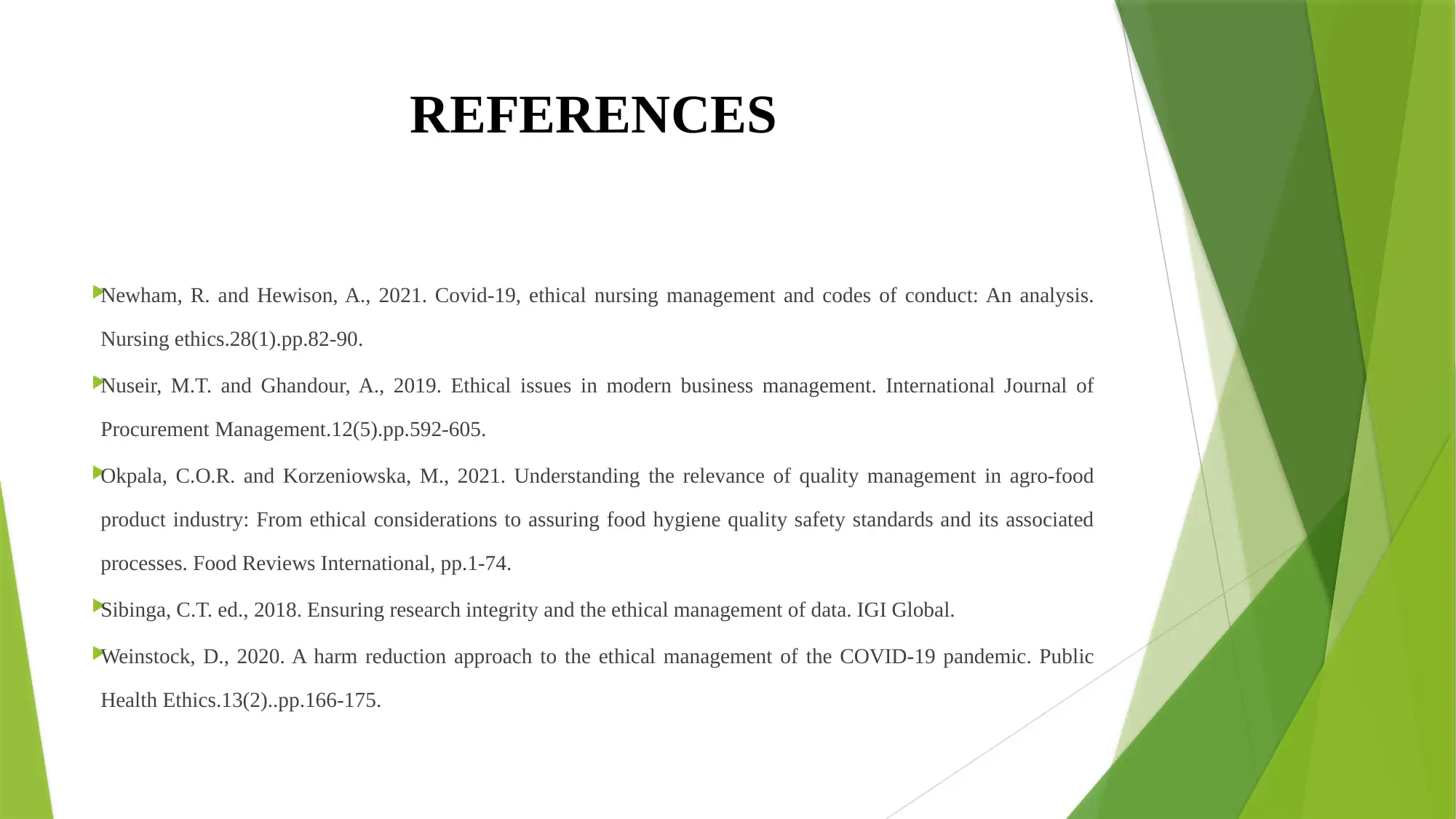
REFERENCES
Newham, R. and Hewison, A., 2021. Covid-19, ethical nursing management and codes of conduct: An analysis.
Nursing ethics.28(1).pp.82-90.
Nuseir, M.T. and Ghandour, A., 2019. Ethical issues in modern business management. International Journal of
Procurement Management.12(5).pp.592-605.
Okpala, C.O.R. and Korzeniowska, M., 2021. Understanding the relevance of quality management in agro-food
product industry: From ethical considerations to assuring food hygiene quality safety standards and its associated
processes. Food Reviews International, pp.1-74.
Sibinga, C.T. ed., 2018. Ensuring research integrity and the ethical management of data. IGI Global.
Weinstock, D., 2020. A harm reduction approach to the ethical management of the COVID-19 pandemic. Public
Health Ethics.13(2)..pp.166-175.
Newham, R. and Hewison, A., 2021. Covid-19, ethical nursing management and codes of conduct: An analysis.
Nursing ethics.28(1).pp.82-90.
Nuseir, M.T. and Ghandour, A., 2019. Ethical issues in modern business management. International Journal of
Procurement Management.12(5).pp.592-605.
Okpala, C.O.R. and Korzeniowska, M., 2021. Understanding the relevance of quality management in agro-food
product industry: From ethical considerations to assuring food hygiene quality safety standards and its associated
processes. Food Reviews International, pp.1-74.
Sibinga, C.T. ed., 2018. Ensuring research integrity and the ethical management of data. IGI Global.
Weinstock, D., 2020. A harm reduction approach to the ethical management of the COVID-19 pandemic. Public
Health Ethics.13(2)..pp.166-175.
⊘ This is a preview!⊘
Do you want full access?
Subscribe today to unlock all pages.

Trusted by 1+ million students worldwide
1 out of 9
Related Documents
Your All-in-One AI-Powered Toolkit for Academic Success.
+13062052269
info@desklib.com
Available 24*7 on WhatsApp / Email
![[object Object]](/_next/static/media/star-bottom.7253800d.svg)
Unlock your academic potential
Copyright © 2020–2026 A2Z Services. All Rights Reserved. Developed and managed by ZUCOL.





